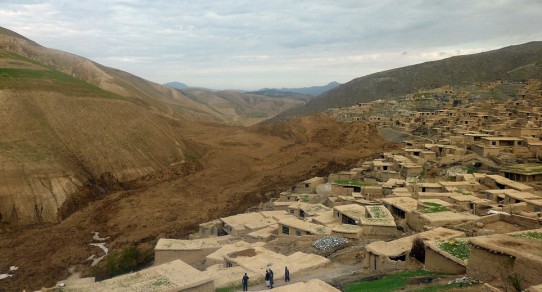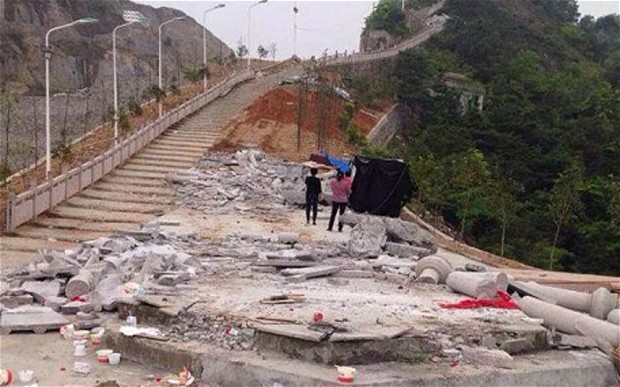News from Afghanistan, North Korea and China
Tuesday's World Events — Posted on May 6, 2014
AFGHANISTAN – Village devastated by landslide
The Afghan government has declared a day of national mourning for residents killed when a mudslide engulfed their village on Friday. Badakhshan provincial governor Shah Waliullah Adib told the BBC there was now no hope for more than 2,000 people believed buried in their homes.

The landslide destroyed hundreds of homes in Ab Barik village
Officials formally ended the search for survivors on Saturday.
Mechanical diggers had left Ab Barik village without being used because the site was inaccessible.
The BBC’s David Loyn said it is unlikely that there will be any serious effort made to recover the bodies.
At least 2,000 people were in their homes when a mountain collapsed and covered the area in mud and rocks.
 A further 600 people are also missing after rushing to help with the rescue effort and being caught in a second landslide.
A further 600 people are also missing after rushing to help with the rescue effort and being caught in a second landslide.
Rudimentary efforts by locals to dig into the soft mud with shovels were quickly abandoned.
A few hundred survivors spent two nights out in the open before blankets, tents and basic food aid arrived.
Heavy rain is believed to have triggered the two landslides, which hit on Friday morning.
Friday is a day of rest in Afghanistan, meaning whole families would have been at home at the time.
“The scale of this landslide is absolutely devastating, with an entire village practically wiped away,” said Richard Danziger, from the International Organization for Migration, which is providing aid to the village.
One survivor, Zia ul-Haq, told reporters: “My family, including my child and all my belongings are buried here.”
Mountainous Badakhshan, which borders Tajikistan, China and Pakistan, is one of the poorest regions in Afghanistan.
NORTH KOREA – Kim Jong-un always surrounded by people taking notes
 In a newly released batch of photographs of North Korean leader Kim Jong-un on a series of site visits, the photos all have one thing in common – the leader is surrounded by officials and generals making notes in identical notepads.
In a newly released batch of photographs of North Korean leader Kim Jong-un on a series of site visits, the photos all have one thing in common – the leader is surrounded by officials and generals making notes in identical notepads.
In the photographs – from the country’s official Central News Agency (KCNA) – Kim Jong-un observes a unit of women conducting a multiple-rocket launching drill. He strides around a fishery station. He gives a pilot on flight training a pep talk. He enjoys the facilities at a renovated youth camp.
The men meticulously taking notes are soldiers, party members or government officials, says Prof James Grayson, Korea expert at the University of Sheffield in England. What is happening is a demonstration of the leader’s supposed power, knowledge, wisdom and concern, says Grayson. It’s “on-the-spot guidance,” something instigated by his grandfather Kim Il-sung in the 1950s. “It’s part of the image of the great leader offering benevolent guidance,” says Grayson.
If Kim’s anything like his grandfather the guidance could be practical advice. Very specific practical advice. After Kim Il-sung visited a fishery in 1976, KCNA published this: “Watching a truck at work, the president said that its bucket seemed to be small in comparison with its horsepower. He said the problem of carriage would be solved if the bucket was enlarged. Afterwards the truck’s bucket capacity increased to two tons from 800 kg. As a result, 20 trucks were capable of carrying the load to be done by 50 trucks.
Despite the fact that tablets are available in the country, paper notebooks remain the favored medium. “These are pictures that will be broadcast on television and shown in the state media, so those who are there want to be seen recording Kim Jong-un’s every word,” says Grayson. “It’s about presenting him as having broad knowledge – however, it’s ridiculous, he can’t possibly know about all of these different things. It’s important, however, that the apparatchiks that surround him are seen to be hanging on his every word.”
According to Prof Steve Tsang, chair the School of Contemporary Chinese Studies at the University of Nottingham in England, the note-takers will be writing extremely carefully. “They wouldn’t want to write down anything that was, say, politically inaccurate, or it might come back to bite them.” The notes are not usually published or available for the public to view, says Tsang. “If anything comes out of them, it would be via the propaganda department. Whether it was what was actually said, or is different to the guidance given at the time, doesn’t matter. No-one will ever question it. If you were at the factory and the advice that was released wasn’t quite what you had in your notebook – what are you going to do about it?”
CHINA – Authorities destroy statues as ‘anti-Christian’ campaign widens
Christian statues depicting Biblical scenes including Jesus’ crucifixion have been destroyed, removed or “hidden” by authorities in a city known as China’s Jerusalem, it has emerged, fuelling fears of a renewed government offensive against Christianity.

Wenzhou’s Longgang Hill, where statues depicting Biblical scenes including Jesus’ crucifixion have been destroyed, removed or “hidden” by authorities.
Around 50 government workers sealed off Wenzhou’s Longgang Hill, a site of Catholic pilgrimage, on April 26 and used bricks to “hide” statues portraying moments from the Passion of Christ.
Statues of Jesus, the Virgin Mary and Saint Joseph, each weighing up to five tons, were “bricked around to hide them from public view” while cranes were used to remove other religious statues and tablets from the park. “All other religious decoration was demolished,” according to UCA News, a news agency covering Catholic issues in Asia.
“About 100 Catholics who came to watch the removals were blocked at the entrance,” said one witness, who asked not to be named because of “security concerns.” “Some who managed to sneak in sang hymns and prayed while watching.”
“The authorities’ behavior is reminiscent of the smashing of church property during the Cultural Revolution,” another member of the city’s Catholic community told UCA News’ Chinese-language service.
The removals, which were first reported on Thursday night (May 1), took place Saturday, April 26, 48 hours before government demolition teams razed a Protestant church in the same city.
Wenzhou’s Sanjiang church became a symbol of resistance to the Communist Party’s draconian religious policies in early April. Thousands of Christians formed a human shield around the place of worship after plans to demolish it were announced, but despite their efforts, the building was eventually leveled last week.
Christians accuse Communist Party leaders in Zhejiang province of attempting to slow their faith’s rapid growth by destroying churches deemed too “conspicuous.”
A list that was compiled by Christian activists and shown to The Telegraph this week names more than 20 churches that are facing or have already suffered some form of demolition work.
Officials deny the demolitions are an attack on Christianity, claiming their campaign is aimed at illegal constructions “including factories and Buddhist temples.”
Authorities would “aggressively push on with the demolition of illegal buildings,” the state-controlled Zhejiang Daily reported this week.
The motive for what appeared to be a “widening crackdown” was unknown but “an increasingly violent standoff between authorities and the church” was now under way, UCA News reported.
Four Catholics were beaten and injured by government officials in Wenzhou last week when an argument broke out during the forced demolition of one church, the news agency claimed.
(The news briefs above are from BBC News on May 4, April 24 and London’s Daily Telegraph on May 1.)
Background
AFGHANISTAN:
The landslide buried around 370 homes, which officials say housed in total some 2,500 people. The UN says only 350 bodies have so far been recovered.
NORTH KOREA: ON THE GOVERNMENT: (from the CIA World FactBook)
- An independent kingdom for much of its long history, Korea was occupied by Japan in 1905 following the Russo-Japanese War. Five years later, Japan formally annexed the entire peninsula. Following World War II, Korea was split with the northern half coming under Soviet-sponsored Communist domination.
- After failing in the Korean War (1950-53) to conquer the U.S.-backed South Korea (Republic of Korea – ROK) by force, North Korea (DPRK), under its founder President Kim Il Sung, adopted a policy of ostensible diplomatic and economic “self-reliance” as a check against excessive Soviet or Communist Chinese influence.
- North Korea demonized the U.S. as the ultimate threat to its social system through state-funded propaganda, and molded political, economic, and military policies around the core ideological objective of eventual unification of Korea under Pyongyang’s control.
- Kim Il Sung’s son, [dictator] Kim Jong Il, was officially designated as his father’s successor in 1980, assuming a growing political and managerial role until the elder Kim’s death in 1994.
- After decades of economic mismanagement and resource misallocation, North Korea since the mid-1990s has relied heavily on international aid to feed its population while continuing to expend resources to maintain an army of approximately 1 million. [Aid agencies estimate that a famine from 1995-1997 killed 2 million to 3 million North Koreans. Foreign food aid was given to North Korea, but the government distributed the majority of it to the military and party leaders.]
- [Kim Jong-il was an oppressive dictator who required that his people call him "Dear Leader"]
- Kim Jong Un was publicly unveiled as his father’s successor in September 2010.
- Following Kim Jong Il’s death in December 2011, the regime began to take actions to transfer power to Kim Jong Un and Jong Un has now assumed many his father’s former titles and duties.
CHINA:
CNN reports: Under Communist Party rule since 1949, China is officially an atheist country, but Christianity is growing. According to the Pew Research Center, China's Christian population had reached 67 million by 2010, the second largest in Asia.
